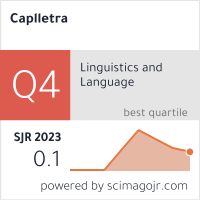Valors adverbials associats a la conjunció «que»: un estudi històric
DOI:
https://doi.org/10.7203/caplletra.38.4882Keywords:
conjunció «que», català, llengües romàniques, subordinades causals, subordinades finals Abstract
Abstract
In this article we will discuss the causal and final adverbial values connected to the conjunction «que» in Catalan and in other Romanic languages. In the first part, we analyse the evolution of the complex conjunctions system in Classical Latin and the posterior oral usages which originated the preliterary Romanic languages. In the second, we study the causal and final subordinate propositions introduced by the nexus «que». As we will try to show, in Medieval Time the nexus que, as it happens today, was used to introduce both argumentative adjuncts, integrated in the predicate, and propositional adjuncts, more external and with a discursive function. Since the 13th century, the progressive substitution of que through other conjunctions will affect causal subordinate and final circumstantial propositions, but otherwise que will maintain its function to introduce discursive causality and finality, specially in oral language.
 Downloads
Downloads
Downloads
Published
How to Cite
-
Abstract420
-
PDF (Català/Valencià)155
Issue
Section
License
Authors submitting work to Caplletra for publication must be the legitimate holder of the usage rights. Legitimacy for the purposes of publishing the work must also include images, tables, diagrams and any other materials that may complement the text, whether they are the author of such material or not.
Copyright: on publishing their work in the journal, the author grants Caplletra. Revista Internacional de Filologia usage rights (reproduction, distribution and public communication) for both the paper printed version and for the electronic version.
All work published in Caplletra is covered by the Creative Commons license type Attribution-NonCommercial-NoDerivatives 4.0 (CC BY-NC-ND 4.0).
RESPONSABILITY
Caplletra. Revista Internacional de Filologia does not necessarily identify with the points of view expressed in the papers it publishes.
Caplletra. Revista Internacional de Filologia accepts no responsibility whatsoever for any eventual infringement of intellectual property rights on the part of authors.







